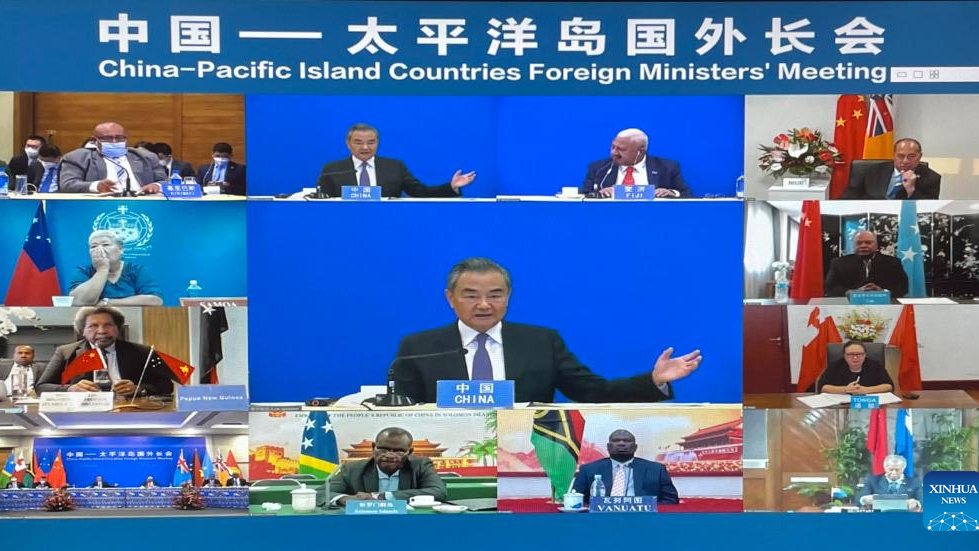
Editor's note: CGTN's First Voice provides instant commentary on breaking stories. The daily column clarifies emerging issues and better defines the news agenda, offering a Chinese perspective on the latest global events.
At the special meeting of foreign ministers between China and the Pacific Island nations, both sides have agreed to deepen their comprehensive strategic partnership. Chinese State Councilor and Foreign Minister Wang Yi said that Beijing can extend cooperation in multiple areas, including: poverty reduction, climate change and disaster prevention. Pacific Island nations voiced their support for the Belt and Road Initiative and Global Development Initiative while reaffirming their commitment to the one-China principle.
A fruitful and constructive summit, wouldn't you say? But, if you only read Western media reports, you'd learn otherwise.
By pointing to a purported "region-wide deal" on economic and security, which wasn't signed at the end of the meeting, the Western media was nearly unanimous in describing it as a total failure. Bloomberg's headline opens with "China suffers setback." Sky News Australia said the deal was "rejected". Financial Times declared it as, "Pacific Islanders snub China."
Australia’s Foreign Minister Penny Wong seized the moment by declaring that "the security of the Pacific is the reasonability of the Pacific family, of which Australia is a part." Western politicians have jumped in with efforts to solidify their hold on the region. It came after a week of scrambling by Western nations, who were opposed to such a deal in the first place. Kurt Campbell, White House's top official for the Indo-Pacific, held a video call with Fiji Prime Minister Frank Bainimarama to discuss security and economic concerns.
As much as the West intends to make it so, the Pacific Island nations are nobody's backyard.

Chinese State Councilor and Foreign Minister Wang Yi co-hosts the second China-Pacific Island Countries Foreign Ministers' Meeting with Fijian Prime Minister and Foreign Minister Voreqe Bainimarama in Suva, Fiji, May 30, 2022. /China's Foreign Ministry
Chinese State Councilor and Foreign Minister Wang Yi co-hosts the second China-Pacific Island Countries Foreign Ministers' Meeting with Fijian Prime Minister and Foreign Minister Voreqe Bainimarama in Suva, Fiji, May 30, 2022. /China's Foreign Ministry
The reported draft communique set off a panic in the West and the unison hailing of victory in the Western media after no such communique came out from the meeting shows the depths of the backyard mentality of the West. They believe the Pacific Ocean remains their domain alone, and that the Pacific Island nations must be under their protection and jurisdiction. Beijing's expanding cooperation with the region should not be viewed as an increasing threat to the West's interests.
Hasn't the world suffered enough from these kinds of thinking over spheres of influence, backyards' mentality and zero-sum games' geopolitical viewpoints? Every nation has different national needs. No one country can provide everything to another. It is normal and necessary for countries to do business and structure agreements with all kinds of countries in order to satisfy their various national interests. The Pacific Island nations can have a close relationship with the U.S. and the West while developing better ties with Beijing. These actions are not contradictory, and neither are they exclusive to one another.
China and the Pacific Island nations have had a fruitful relationship since establishing diplomatic ties long ago. China has implemented nearly 500 complete plant projects, technical assistance, in-kind assistance and concessional loan projects in the Pacific Island countries to help them build crucial infrastructure. From 1992 to 2021, the trade volume between them has had to average annual rate increases of 13 percent, which have multiplied by over 30 times. And Beijing will provide 2,500 government scholarships and 3,000 human resources' training opportunities for these countries from 2020 to 2025.
From the West's perspective - especially with the U.S. and Australia - the region's closer ties with China would be seen as a textbook Cold-War-like "expansion" of a sphere of influence by Beijing. That’s unacceptable for them. After the China-Solomon security deal had set off alarm bells in their minds, a broader agreement between Beijing and nations in the region have emerged to be seen as the modern Rubicon. Crossing and as such the West would deem itself as having lost to China forevermore.
The "Backyard mentality" is causing numerous conflicts all over the world and undermining genuine cooperation among nation states. As long as the West clings to the geopolitical mindset of past ages, the world would remain divided and conflicted. Because in their eyes, the Iron Curtains should stay erected everywhere.
(If you want to contribute and have specific expertise, please contact us at opinions@cgtn.com. Follow @thouse_opinions on Twitter to discover the latest commentaries in the CGTN Opinion Section.)

